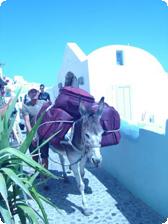by Maureen Stone
I love calypso music and I love Trinidad, the land of calypso! From the time of my first visit to Trinidad in 1966, however, I have been warned about how dangerous this beautiful island is—certainly not the sort of place where a woman should go hiking on her own.
Yet at four o’clock in the morning, I find myself driving along a dark, deserted Trinidadian road with my faithful local friend. While I frequently travel alone, more often than not I have friends or acquaintances in the places I visit, so I am never lonely or isolated.
In Trinidad, I always hook up with my walking companion, and on this occasion we’d set out for an early morning walk, having once again ignored the warnings and advice. In order to enjoy our walk we had to make an early start: by four o’clock if possible and not later than five. Four was best because it meant that we could finish our walk with a quick swim before my friend had to hurry off to work.
Whenever we returned to Port-of-Spain after our walks, we would be received with the same horror and amazement at our stupidity, and with warnings that our luck would soon run out. But this was 1990, when guns had not yet taken hold of Trinidadian society in they way they have today, so went on walking.
As we drove along that deserted Trinidadian road, the silence was suddenly broken by lights and the sound of voices. Not at all concerned about our luck running out, we stopped to find out what was going on. It was only a group of biologists from the University of the West Indies: students, two lecturers, and guide, all on an expedition to El Tucuche, Trinidad’s second highest mountain (936m) in search of the golden tree frog (Phyllodytes auratus, 35mm), which lives in the giant bromeliads on the highest peaks of the mountain.
I was wearing shorts over my swimsuit and had a large beach towel: hardly suitable attire for a mountain expedition, but I had always wanted to go up El Tucuche and I was not going to miss this opportunity. So I asked if I might join them. The response—“At your own risk”—was not very welcoming, but it was enough for me to abandon my friend and our plans for a gentle hike and a swim.
At first the walking was easy, but soon the terrain became steep, the ground slippery, and the temperature chilly. The pace was slow: many of the students, although very young, were unfit and unused to hiking. My problem was the cold. We could have been in England—except that in England I would never have gone for a walk up a mountain wearing a swimsuit and wrapped in a beach towel.
I tried to distract myself by focusing on the beauty of the surroundings, especially the profusion of wild orchids. I always prefer wild to cultivated flowers and these orchids were in a class of their own. After about two hours, we reached the ridge and the search began. The methods of these biologists were more reminiscent of Attila the Hun than David Attenborough, as they ripped up and tore apart the giant bromeliads in their search for the golden tree frogs that live within them.
Their efforts were in vain. Unlucky biologists, lucky frogs, I thought to myself, for although I was grateful to the biologists for allowing me to join their expedition, my sympathy was very much on the side of the frogs. I also felt sorry for the majestic bromeliads, now lying limp and scattered on the ground, dead. I looked on, hoping that any signs of my distress would be interpreted as a reaction to the cold. My position as an uninvited guest did not give me the confidence to ask questions or make comments about their approach. I did not want to repay their kindness to me by criticizing what seemed to me like unkindness toward the frogs and the bromeliads. So I kept quiet.
It began to rain; it got colder. The expedition stopped for lunch. As they say in Trinidad, there was “plenty, plenty food,” but we could not really enjoy it. We had to eat quickly in order to avoid rainwater dripping into the food. The lecturers drank hot coffee from their thermoses while the rest of us looked on enviously. In their waterproofs, the lecturers and the guide were dry; in their shorts and T-shirts, the students were soaked through, and I in my shorts and swimsuit shivered along with them in the biting cold and rain. The lecturers were amused by the condition of their students and joked about how many of them would be off with pneumonia the following week.
After lunch, there was a meeting to decide whether to abandon the search or to explore adjoining areas. The matter was put to a vote. I did not join in either the discussion or the vote, silently indicating that I would go along with the majority decision. The students voted to leave the mountain, but the lecturers instructed us to stay put while they and the guide went to explore further. I pulled my soaking wet towel tighter in a vain attempt to stop my teeth from chattering. I was not happy.
The instructors and guide wandered off while the rest of us waited, getting colder and wetter. Eventually, our patience ran out and the students decided that we should leave the mountain. Still shivering, I followed them, robot-like, until I slipped and almost fell off the mountainside! I saved myself by grabbing the roots of a tree. That fall and the quick downhill pace warmed me up. I began to feel hopeful about getting back in one piece—hopeful enough to be amused when one of the female students said, “Some day we will tell our grandchildren about this adventure!” This reminded me of my grandson at home in England and I thought to myself, “Some of us sooner than others!” as she walked on, unaware that one of us was already a grandmother.
We were almost back when the lecturers and guide caught up with us. Their search had also ended in failure, so the rare and endangered golden tree frog remained safe from the attentions of the biologists for the time being.
Not long after this, we heard the barking of dogs. I have never before (or since) welcomed the barking of dogs. But that day, as we came down El Tucuche, the barking and snarling of the village dogs was music to my ears. Dogs meant people, a village with a shop, a café, chairs, and a telephone.
Soon I was actually sitting in the café, my towel now discarded, and drinking a delicious cup of tea. It was probably just ordinary tea, but to me nothing was ordinary at that moment. An old man came in, sat down at my table, and began asking questions about the expedition, wanting to know what the conditions were like up there. “Had it been cold, had it been raining?” he asked. I assured him that it had been very cold, and yes, it had rained nonstop. He then said that there had been warnings about the likely bad conditions, with advice for people to stay away from El Tucuche. He said that we should not have gone up the mountain that day. I listened and wondered whether the organizers and the students had been aware of the warning. It seemed that my friend and I were not the only people to ignore warnings of danger!
The important thing was that none of us had been hurt. Even the golden tree frog had escaped being captured, studied, and almost certain death, and only some of the giant bromeliads had been laid waste. A small price to pay? Who can say?
Within an hour of coming off the mountain, I was getting ready for an evening at the theater in Port-of-Spain. Later that night, in the heat and humidity of the city, the cold, swirling mist of El Tucuche, with its beautiful wild orchids and elusive little golden tree frogs, already seemed to belong to another world.
The story does not quite end there. About seven years after my El Tucuche walk in June 1997, I at last got the chance to see a golden tree frog (albeit of another species) living in the giant bromeliads that grow around the Kaieteur Falls in Guyana. The frog was sunning itself on one of the leaves. I’d never expected to find a frog beautiful, but I was so transfixed that I forgot to take a picture, even though I had my camera at the ready.
© Maureen Stone 2003
* * * *
Maureen Stone, PhD is a sociologist, traveller, and writer. You can learn more about her at www.blackwomanwalking.com.







